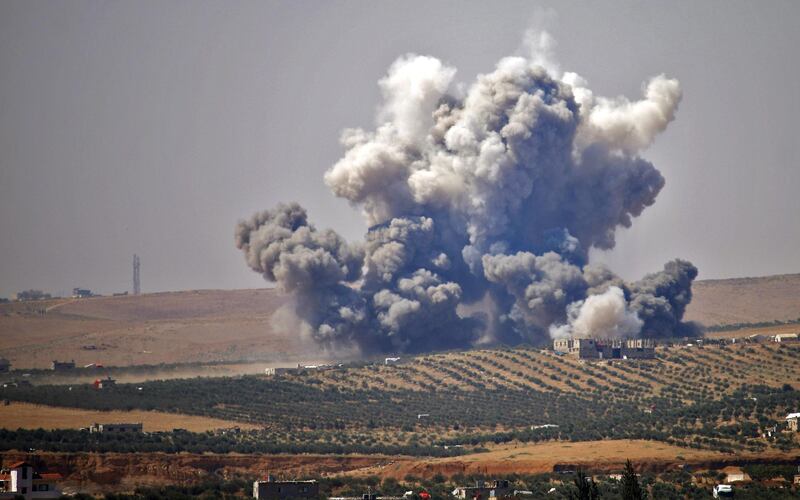Russia unleashed heavy air strikes on Deraa province on Thursday as the Syrian opposition accused Moscow of betraying its obligation to uphold a ceasefire in the country's south-west.
The renewed bombardment ended a four-day lull in a government offensive to retake Deraa as Russia negotiated with rebel groups for terms to hand over control of the area to Damascus. The talks collapsed on Wednesday with the rebels rejecting the demands laid down by Russia, a key ally of Syrian President Bashar Al Assad.
Mr Al Assad has set his sights on recapturing Deraa, considered the cradle of the uprising against him in 2011, as well as neighbouring Quneitra province, which border Jordan and the Israeli-occupied Golan Heights region.
"We expected Russia to take a different stance towards the Syrian people, yet we knew when the uprising happened that the Russian president was going to support the brutal regime," Yahya Al Aridi, spokesman for the Syrian High Negotiations Committee, told The National.
The heavy bombardment and ground assaults by pro-Assad forces have killed more than 100 civilians and forced about 330,000 civilians to flee their homes, triggering a fresh humanitarian crisis in Syria's seven-year-old civil.
World powers criticised the offensive for violating a "de-escalation" deal for southern Syrian that Moscow, Washington and Amman agreed upon last June, which was aimed at reducing the fighting and prevent it from reaching the borders with Jordan and Israel. The truce had largely held until Mr Al Assad's forces launched their offensive on Deraa on June 9.
"There needs to be a reactivation of the de-escalation agreement and for Russia to respect its word. It seems that it's not used to respecting its words," Mr Al Aridi said.
He said Washington agreed to the ceasefire because of its "closeness to Israel — what concerns the US the most in this region is Israel and it security".
"Israel claims either Assad stays in power, or let Syria get destroyed as long as its borders are protected by the regime," Mr Al Aridi said.
Washington had warned in May of "firm and appropriate measures" if Mr Al Assad attacked the de-escalation zone but later told rebels there that it would not intervene on their behalf.
“As the world remains silent and the US being loose in its policy, it has allowed Putin to turn Syrians into mice by testing out his weapons,” Mr Al Aridi said. “There is no consideration for the civilians who are being punished on a daily basis.”
The displaced residents of Deraa are living in dire and insecure conditions, including 60,000 at the border crossing with Jordan, according to the UN. Both Jordan and Israel have kept their borders closed, despite mounting calls by rights groups to let Syrian civilians cross to safety.
_________________
Read more
Israel’s Netanyahu to meet with Putin in Moscow next week
Jordan mediating Russia and rebel talks for souther Syria handover
WATCH: The devastation of Syria’s Deraa province
_________________
The Syrian Observatory for Human Rights, a UK-based war monitor, said about 600 air strikes were reported in Deraa after the truce negotiations collapsed on Wednesday, including on rebel-held parts of Deraa city, the provincial capital.
The state news agency Sana said Syrian troops has entered the town of Saida after intense clashes. The town is about six kilometres from the Naseeb border crossing with Jordan, a major trade conduit that is one of the main goals of Mr Al Assad's offensive.
The Observatory said Thursday's bombardment was an "attempt to make the rebels back down after they refused to subject themselves to the Russian terms for a ceasefire".
The air strikes resumed on Wednesday afternoon after rebels met Russian negotiators and declared that the talks had "failed" over Moscow's demand that they surrender their heavy weapons.
"These were not negotiations but pressures, dictations, threats and humiliations," said Ibrahim Jabawi, spokesman for the rebels' joint operations room.
Mr Al Aridi said the Russians' claim that they were "combating terrorists in the region" was flawed as "ISIS and Al Nusra fighters managed to escape by shaving their beards and disguising themselves as women".
"It seems to us that even children that say 'no' to the Assad regime are considered terrorists," he said.
More than 30 towns have surrendered since the Deraa offensive began, extending the regime's control to about 60 per cent of the province — double what it held before.
Last week, the UN Syria envoy, Staffan de Mistura warned against the "devastating" battle.
“Let us be aware of what this would mean, if the south-west sees a full-scale battle to the end, it could be like eastern Aleppo and Eastern Ghouta combined together,” Mr de Mistura told the UN Security Council last week, referring to previous regime offensives that took a heavy toll on civilians.
The Security Council scheduled an emergency situation on Thursday to discuss the situation.






